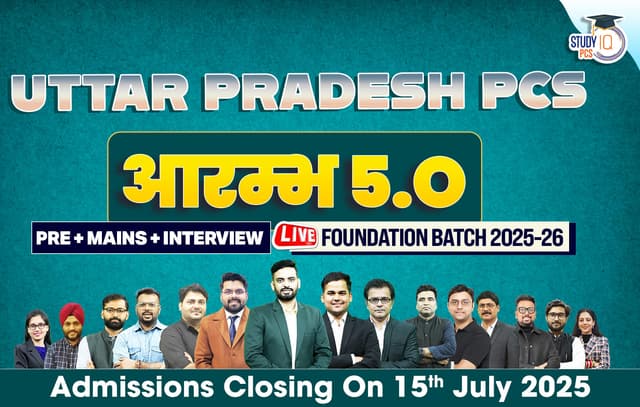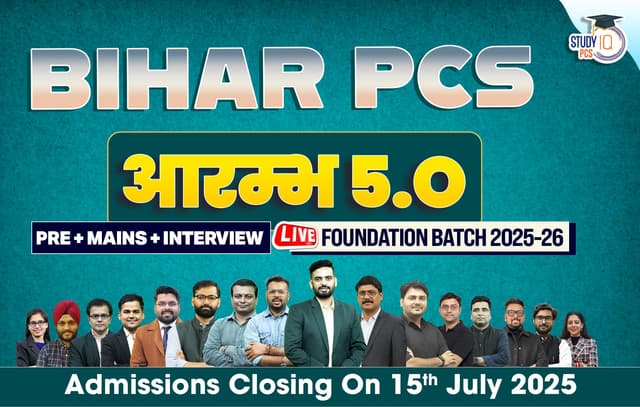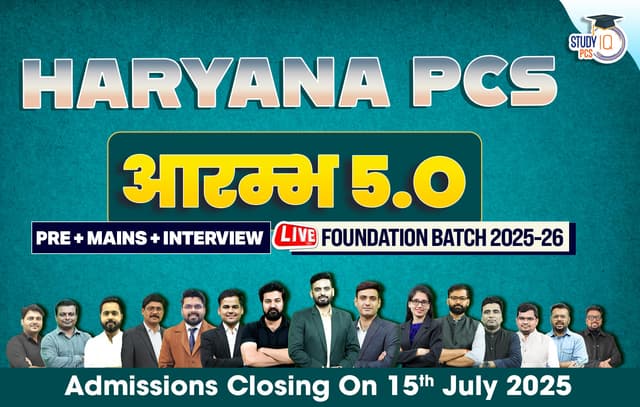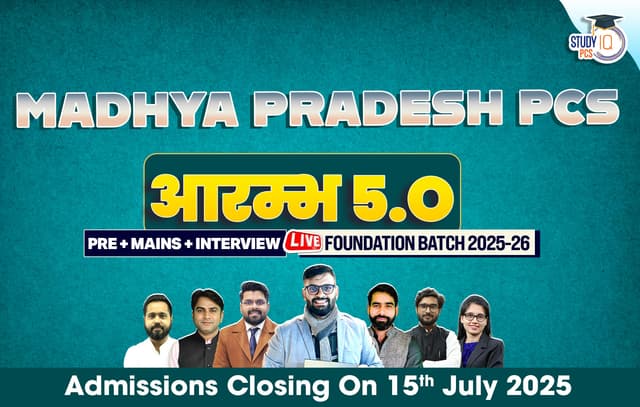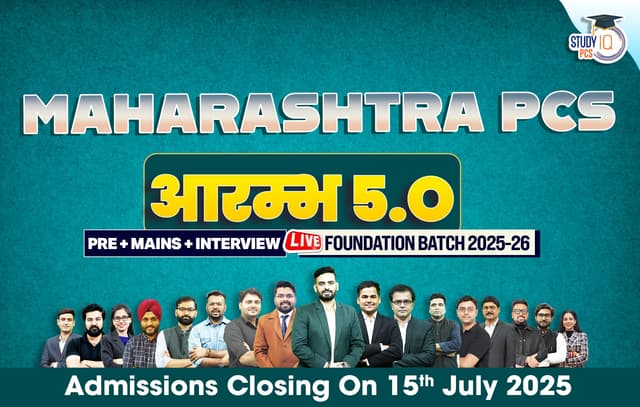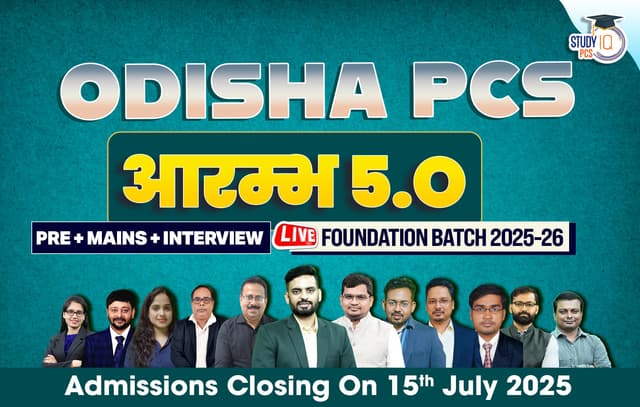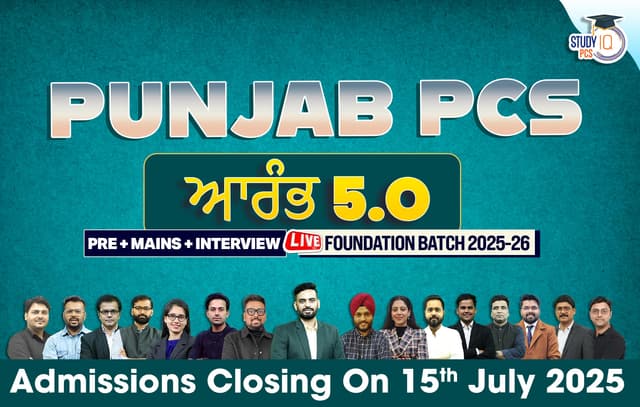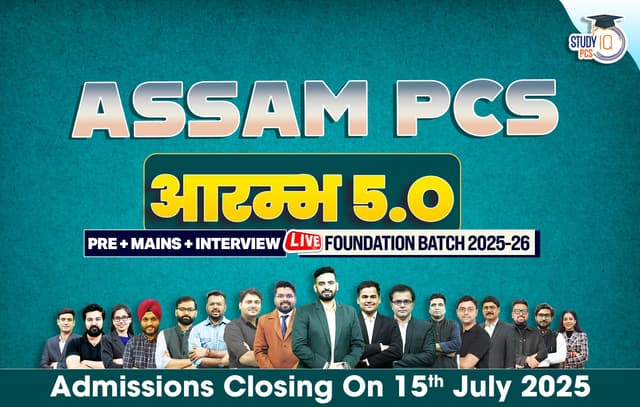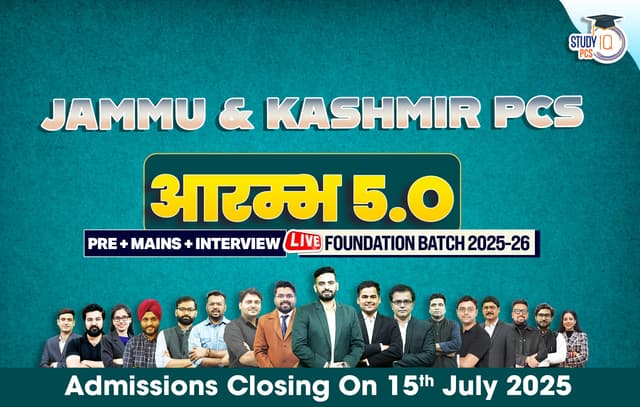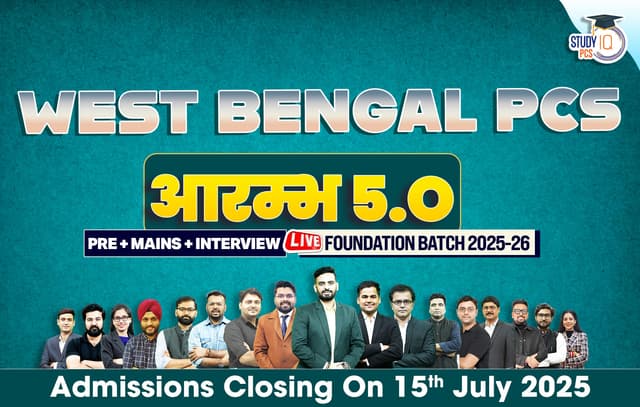Table of Contents
Tamil Nadu Public Service Commission (TNPSC) conducts The Combined Civil Services Examination Group II (CCSE-II), which is held annually and is used to find candidates for the state of Tamil Nadu’s various civil services. For Group 2 and 2A posts, TNPSC administers the CCSE-II tests. It is advised to review the TNPSC Group 2 Syllabus, exam pattern, and curriculum before beginning exam preparation.
TNPSC Group 2 Syllabus 2024
The commission announces the openings for Group 2 and Group 2A under two divisions. The sole exam distinction between Group 2 and Group 2A is the interview. Group 2 contains openings with interviews, while Group 2A has openings without interviews.
According to the updated TNPSC Group 2 Syllabus, General English, an optional subject that was previously General Tamil, has been introduced to the TNPSC Group 2 Prelims Exam. There have also been minor changes made to TNPSC Group 2 Mains Paper-I.
| TNPSC Group 2 Exam | |
| Particulars | Details |
| Exam Conducting Body | Tamil Nadu Public Service Commission |
| Name of the Exam | TNPSC Group 2 Exam 2024 |
| TNPSC Group 2 Selection Process |
|
| Total Marks |
|
| Exam Duration | Prelims: 3 hours
Mains: 3 hours (Paper I)+ 3 hours (Paper II) |
| Final Merit list based on | For interview posts:Mains+ Interview= 340 marks
For Non-Interview Posts: Mains = 300 marks |
| Language of Exam | English, Tamil |
| Mode of Exam | Offline Mode |
| Mode of Counselling | Offline Mode |
TNPSC Group 2 Selection Process
- Prelims
- Main
- Interview (only for Group 2 posts)
TNPSC Group 2 Prelims Syllabus 2024
The TNPSC Group 2 Prelims Syllabus consists of 200 questions of this nature. General Tamil, General Studies and the Aptitude Test are the three sections of the prelims exam. All of the significant general studies and general aptitude topics are covered in this list. The table below lists the subjects that will be covered in the TNPSC Group 2 Prelims:
| Subject | Topics |
| Part A – English Grammar | English Grammar Includes: Phrases, Synonyms, Antonyms, Prefix & Suffix, Fill in the blanks, Prepositions, Tenses, Voice, Homophones, Error Detection, Comprehension, Odd one out, Word Formation, Identify the sentence, Compound words |
| Part B – English Literature | English Literature Includes: Figure of Speech, Appreciation Questions from Poetry, Important Lines from Poem, Biography of Important persons, Shakespeare, Oscar Wilde, Dr Karl Paulnack, Comprehension Question from Motivational Essays, British English-American English, Comprehension Question from Description of Places. |
| Part C – English Author & There Literary Works | English Author & There Literary Works: Poem & Poets, Author & their stories, Biography & Auto Biography, Characters, Quotes, Important Lines of Indian Authors, Nationality of story, Drama, Folk Arts, About Poets, Dramatist, Famous Quotes, Various Works of Author, Period of the poets, Nature centered Literary works and global issue Environment & Conservation, Theme observed in Literary Work. |
| General Science in Day to Day Life and Environment and Ecology | Scientific Knowledge and Scientific temper – Power of Reasoning – Rote Learning Vs Conceptual Learning – Science as a tool to understand the past, present and future |
| Physics Includes: Universe – Scientific Laws – Matter and its Properties, Force, Motion and Energy – Everyday application of the basic principles of Mechanics, Electricity and Magnetism, Light, Sound, Heat, Nuclear Physics, Laser, Electronics and Communications | |
| Chemistry Includes: Elements and Compounds, Acids, Bases, Salts, Petroleum Products, Fertilizers, Pesticides | |
| Biology Includes: Classification of Living Organisms, Evolution, Genetics, Physiology, Nutrition, Health and Hygiene, Human diseases, Main concepts of Life Science | |
| Environment and Ecology | |
| Current Events | Personalities and places in news – Sports – Books and authors |
| Current Affairs on Polity & Governance – Government Welfare schemes, Policies, Act etc | |
| Resent Geographical Phenomenon’s, Important place in news | |
| Economic Survey, Budget etc. | |
| Important research and Inventions in the field of Science and Technology | |
| Geography of India | Geographical Acts as: Indian Monsoon, rainfall, weather, Cyclonic activities and climate, – Water resources – Rivers in India – Soil, minerals and natural resources – Forest and wildlife – Agricultural pattern |
| Transport – Communication | |
| Population density and distribution – Racial, linguistic groups and major tribes | |
| Disaster around the World – Disaster Management – Environmental pollution: Reasons and preventive measures – Climate change – Green energy | |
| History & Culture of India | Harappa civilization – Age of Guptas, NW Invasion, Slave Dynasty, Delhi Sultans, Era of Mughals and Marathas – Age of Vijayanagaram and Bahmani Kingdoms – South Indian history |
| Change and Continuity in the Socio-Cultural History of India | |
| Indian culture and its development since past, Unity in diversity – Race, language, custom | |
| India as a Secular State, Social Harmony | |
| Indian Polity | Indian Constitution and Its Salient features – Preamble – Union, State and Union Territory |
| Citizenship, Fundamental Rights, Fundamental duties, Directive Principles of State Policy | |
| Union Executive, Union legislature – State Executive, State Legislature – Local governments, Panchayat Raj | |
| Spirit of Federalism: Centre-State Relationships | |
| Election – Judiciary in India – Rule of law | |
| Corruption in public life – Anti-corruption measures – Lokpal and Lok Ayukta – Right to Information – Empowerment of women – Consumer protection forums, Human rights charter | |
| Indian Economy | Nature of Indian Economy – Five year plan models – an assessment – Planning Commission and Niti Ayog |
| Sources of revenue – Reserve Bank of India – Fiscal Policy and Monetary Policy – Finance Commission – Resource sharing between Union and State Governments – Goods and Services Tax | |
| Structure of Indian Economy and Employment Generation, Land reforms and Agriculture – Application of Science and Technology in agriculture – Industrial growth – Rural welfare oriented programmes – Social problems – Population, education, health, employment, poverty | |
| Indian National Movement | National renaissance – Early uprising against British rule – Indian National Congress – Emergence of leaders – B.R.Ambedkar, Bhagat Singh, Bharathiar, V.O.Chidambaranar, Jawaharlal Nehru, Kamarajar, Mahatma Gandhi, Maulana Abul Kalam Azad, Thanthai Periyar, Rajaji, Subash Chandra Bose and others |
| Different modes of Agitation: Growth of Satyagraha and Militant movements | |
| Communalism and partition | |
| History, Culture, Heritage and Socio-Political Movements in Tamil Nadu | History of Tamil Society, related Archaeological discoveries, Tamil Literature from Sangam age till contemporary times |
Thirukkural:
|
|
| Role of Tamil Nadu in freedom struggle – Early agitations against British Rule – Role of women in freedom struggle | |
| Evolution of 19th and 20th Century Socio-Political movements in Tamil Nadu – Justice Party, Growth of Rationalism – Self Respect Movement, Dravidian movement and Principles underlying both these movements, Contributions of Thanthai Periyar and Perarignar Anna | |
| Development Administration in Tamil Nadu | Human Development Indicators in Tamil Nadu and a comparative assessment across the Country – Impact of Social Reform movements in the Socio-Economic Development of Tamil Nadu |
| Political parties and Welfare schemes for various sections of people – Rationale behind Reservation Policy and access to Social Resources – Economic trends in Tamil Nadu – Role and impact of social welfare schemes in the Socio-Economic development of Tamil Nadu | |
| Social Justice and Social Harmony as the Cornerstones of Socio-Economic development | |
| Education and Health systems in Tamil Nadu | |
| Geography of Tamil Nadu and its impact on Economic growth | |
| Achievements of Tamil Nadu in various fields | |
| e-governance in Tamil Nadu | |
| Aptitude and Mental Ability | Simplification – Percentage – Highest Common Factor (HCF) – Lowest Common Multiple (LCM) |
| Ratio and Proportion | |
| Simple interest – Compound interest – Area – Volume – Time and Work | |
| Logical Reasoning – Puzzles – Dice – Visual Reasoning – Alphanumeric Reasoning – Number Series |
Also, Check TNPSC Group 2 Salary
TNPSC Group 2 Mains Syllabus 2024
The TNPSC Group 2 Mains Exam is going to be entirely written. There are two papers in it: Paper I and Paper II.
TNPSC Group 2 Mains Syllabus Paper 1
The subjects and material covered in the exam are listed here in both Tamil and English translations. View the complete syllabus in the table below.
| Subjects | Topics |
| Tamil to English translation |
Phrases, Synonyms, Antonyms, Prefix & Suffix, Fill in the blanks, Prepositions, Tenses, Voice, Homophones, Error Detection, Comprehension, Odd one out, Word Formation, Identify the sentence, Compound words
|
| Hints Development |
Poem & Poets, Author & their stories, Biography & Autobiography, Characters, Quotes, Important Lines of Indian Authors, Nationality of story, Drama, Folk Arts, About Poets, Dramatist, Famous Quotes, Various Works of Author, Period of the poets, Nature-centered Literary works and global issue Environment & Conservation, Theme observed in Literary Work
|
| Precis writing |
Phrases, Synonyms, Antonyms, Prefix & Suffix, Fill in the blanks, Prepositions, Tenses, Voice, Homophones, Error Detection, Comprehension, Odd one out, Word Formation, Identify the sentence, Compound words
|
| Essay Writing in Thirukkural |
Essay writing on the following topics from ‘Thirukkural’ (a) Significance as Secular literature (b) Relevance to Everyday Life (c) Impact of Thirukkural on Humanity (d) Thirukkural and Universal Values – Equality, Humanism, etc. (e) Relevance to Socio- Political- Economic affairs (f) Philosophical content in Thirukkural
|
| English to Tamil translation |
The figure of Speech, Appreciation Questions from Poetry, Important Lines from Poem, Biography of Important persons, Shakespeare, Oscar Wilde, Dr. Karl Paulnack, Comprehension Questions from Motivational Essays, British English-American English, Comprehension Questions from Description of Places
|
TNPSC Group 2 Mains Syllabus Paper-II
| Units | Topics |
| Modern History of India with specific reference to Tamil Nadu |
The advent of Europeans: The Portuguese, the Dutch, the English, the Danish and the French;
Expansion of British rule: Carnatic Wars; Early uprisings against British Rule: Revolt of Poligars, South Indian Rebellion, Vellore Mutiny, Indian National Movements – Moderates, Extremists and Terrorist Movements – Gandhian Era; The early stage of Freedom movement in Tamil Nadu – First voice for freedom struggle from Tamil Nadu – Protests by Pulithevar, Veerapandya Kattabomman, Dheeran Chinnamalai, Velunachiar, Kuyili and others; Role of Tamil Nadu in freedom struggle – V.O.Chidambaram, Bharathiyar, V.V. Subramanian, Vanchinathan, Subramania Siva, T.S.S Rajan, Rajaji, Sathyamoorthy, Kamaraj, Rukmani Lakshmi Pathi, Ambujammal and others; Types of freedom struggle – Sacrifices – Magazines – Literature – Plays/Drama – Songs – Films etc.; Contribution of women in the freedom struggle and social work: Dr Muthulakshmi Ammaiyar, Muvalur Ramamirtham, Cuddalore Anjalai mmal, Thillaiyadi Valliammai, and others; Impact of British Rule: Christian Missionaries, Development of Education, Judiciary, Local Self Governance System, Police, Transport and Communication – Disappearance of Indigenous Industries – Spread of Western Culture; Origin and Growth of “Social – Justice” ideology, Socio- Religious Movements, Political Parties and Achievements. |
| Social Issues in India with specific reference to Tamil Nadu |
Population Explosion: Fertility – Mortality – Migration – Morbidity – Census 2011 – Population control programmes – National Population Policy 2000 – Family planning and its achievements;
Health Care: Poor sanitation – Rural and Urban disparities – Poor infrastructure – Insufficient health care delivery – Role of Panchayat Raj and Urban Development Agencies – Health policy in India – Health care programmes in India; Child Labour and Child Abuse: Child Education – School Dropouts – Gender disparities – Initiatives to eliminate Child Labour in India – Media and enhanced vulnerability – Laws to protect child abuse and welfare schemes; Women Empowerment: Domestic violence – Dowry problems – Sexual assault – Eve teasing – Kidnapping – Laws and awareness programmes – Role of Government and NGOs in women empowerment – Welfare schemes; Marginalised Groups: Problems – Scheduled Castes and Scheduled Tribes – Elderly – People with disability – Transgender – Religious minorities – Central and State Government welfare programmes to marginalised groups. Social Changes: Urbanization – Modernization – Globalization – Policy, Planning and Programmes in India – Impact of Violence on Society – Religious Violence – Terrorism and Communal Violence – Causes and Remedies; Current Affairs. |
| Constitution, Polity and Governance in India with specific reference to Tamil Nadu |
Constitution of India: Preamble and Philosophical features – Salient features and Sources – Union, States and Union Territories – Citizenship
Fundamental Rights Fundamental Duties Directive Principles of State Policy; Union Executive: President, Vice-President, Prime Minister and Council of Ministers – Cabinet – Parliament (Lok Sabha and Rajya Sabha) – Parliament Committees – Major Constitutional Amendments; State Government: Chief Minister and Council of Ministers – Tamil Nadu Legislative Assembly: Structure, Powers and Functions; Local Governments: Three-tier system – 73rd and 74th Constitutional Amendments – Tamil Nadu Panchayat Act 1994 – Grama Sabha – Working of PRIs in Tamil Nadu – District Collector’s role in Development Administration; Dynamics of Indian Federalism: Centre-State relations: Administrative, Legislative, Financial – Issues and Challenges; Judiciary in India: Supreme Court, High Courts, District Courts – Subordinate Courts (Structure and Functions) – Judicial Review – Judicial Activism – Public Interest Litigation; Electoral System in India – Election Commission (Constitutional Provisions, Composition, powers and functions); Party system in India: Regional and National political parties in India and Tamil Nadu; Integrity in Indian Polity: Corruption in Politics – Anti-Corruption measures: Lokpal and Lok Ayukta – Central Vigilance Commission, Comptroller and Auditor General of India – Central Bureau of Investigation – Enforcement Directorate – Right to Information – Right to Services – Consumers’ Rights – Consumer Protection Act 2019 – Human Rights Act 1993 – National Human Rights Commission, State Human Rights Commission – Social Audit – Citizen’s Charter; Political parties in Tamil Nadu: Regional and National Parties – Welfare schemes and measures of successive Governments in Tamil Nadu after 1947 – Reservation and Language policy in Tamil Nadu – Impact of welfare schemes and measures in the socio-economic development of Tamil Nadu; Education and Health Administrative Structure in Tamil Nadu: Evolution – Achievements of Tamil Nadu in various fields: Education, Health, Industrial, Information Technology, Agriculture, Women and Marginalised Groups; E-governance and Mobile– governance initiatives in Tamil Nadu – Public Service Delivery through e-governance. TNeGA – eService Centres; Problems in Public Service delivery in Tamil Nadu; Current Affairs. |
| Geography of India, Environment, Biodiversity and Disaster Management in India with specific reference to Tamil Nadu |
Geographical Location – Physical units – River system – Climate – Soil – Natural vegetation – Agriculture crops – Livestock – Fisheries; Irrigation – Multipurpose Projects;
Minerals: iron ore, manganese, copper, bauxite, gold, silver, mica, coal, petroleum and natural Gas; Energy Resources: hydel, thermal, nuclear, wind, tidal and solar; Industries: textile, jute, sugar, cement, iron and steel, automobile and shipbuilding; Transport: road, railway, water and air; Environment – Global and national environmental issues – pollution – air, water, soil, thermal, radioactive, noise, electronic and solid wastes – Management of municipal solid wastes and bio-medical wastes; Biodiversity and Conservation: Definition, types – genetic, species and ecosystem diversity – values – threats to biodiversity – habitat destruction, invasive species and anthropogenic activities – climatic change and wildfire; Causes and consequences of species extinction; Biodiversity conservation: in-situ and ex-situ; Biodiversity conservation strategies: international environmental governance – Biodiversity Act (BDA), International Union for Conservation of Nature (IUCN), Convention on International Trade in Endangered Species (CITES), and World Wide Fund for Nature (WWF); Biodiversity hotspots of India; Sustainable development – Sustainable development goals and targets – Clean and Green energy Paris Agreement and COP28; Disaster Management: Overview of disasters – definitions and types; Introduction to disaster risk management framework; Natural calamities – Anthropogenic disasters – global warming and climate change, industrial accidents; Climate change governance – mitigations and adaptations; Role of space technology in disaster management, National action plan for climate change – Tamil Nadu State Disaster Management Authority – Tamil Nadu Disaster Management Plan – Role of NGO and Civil society organisation in disaster management and mitigation in Tamil Nadu; Current Affairs. |
| Tamil Society – Culture and Heritage |
Ancient Tamil Society – Archeological excavation evidence – Arikamedu, Adichanallur, Keezhadi – Sangam Literature – Classical Tamil;
Thirukkural – Guidance for way of life to human elevation – Guidelines given by Thirukkural in the field of administration, judiciary and day to day life – Philosophical thoughts laid down by Thirukkural for the betterment and integration of the whole of humanity; Sociopolitical movements of 19th and 20th centuries, Vallalar’s Samarasa Sutha Sanmarga Satya Sangam –Origin and development of Justice Party – Impact of Rationalism Movement, Self-Respect Movement, History and Development of Dravidian Movement, Tani Tamil Iyakkam (Pure Tamil Movement) – Tamil Society Reforms personalities – Thanthai Periyar, Arignar Anna, and other scholars; Arts – Cultura conventions of Tamilians – Ancient cultural knowledge of Tamilians – Conventional thoughts of Tamilians; Cultural Elements: Tamil Nadu State Government Symbols – Experts in Cultural Fields – Folk Dances, Folk Music, Folk Drama, and World Tamil Conferences. |
| Science and Technology in Development |
Robotics and Applications;
Atomic and Nuclear Physics – Applications of nuclear energy; Diodes and Transistors and their Applications; Broadcasting Technology; Electrochemical cells – Types of electrodes – Batteries – Lithium-ion Battery; Fuels: Gaseous fuels – LPG, Natural gas and water gas; Polymers: Thermoplastics and Thermosetting plastics, PVC, PET, Nylon 66, Teflon; Medicinal Chemistry: Analgesics – Paracetamol and Aspirin, Antibiotics – Penicillin and Chloromycetin; Biotechnology: Applications of Biotechnology – Plant Genetic Engineering – concepts – transgenic plants, edible vaccines, Terminator Gene technology, BT Cotton, Golden rice, Flavr Savr tomato, Social and ecological impact of genetically modified crops – Biotechnological methods for crop improvement – Application of plant tissue culture in Forestry, Horticulture – Recombinant DNA Technology – DNA cloning – DNA fingerprinting – applications of PCR and ELISA in disease diagnosis – hybridoma techniques in the production of Mono Clonal Antibodies (MCA) – Animal cell culture techniques – stem cells and its applications; Applications of GIS; Nanotechnology – Fundamentals – Applications – Nano Fertilizer, Nano Pesticides, Green Nanotechnology and Nano-farming; Advanced reproductive techniques: In-vitro fertilization (IVF) – Intra–Uterine Insemination (IUI) – Intra Cytoplasmic Sperm Injection (ICSI) – Gamete Intra-Fallopian Transfer (GIFT) – cryopreservation of sperm; Components of Computer – Computer Organization and Architecture – System Software and Application Software – Data Communication Networks – Cryptography – Computer Graphics and Multimedia – Mobile Computing and Communication – Web Technology and Applications – E-Commerce – Cloud Computing Architecture – IOT – Artificial Intelligence Applications – Machine learning – Cyber Security – Biometrics – Blockchain Technology; Current Affairs. |
| Indian Economy with specific reference to Tamil Nadu |
Nature of Indian Economy: An assessment – Structure of Indian Economy – New Economic Policy: Rationale – Components – Privatisation, Deregulation, Trade Liberalisation. Indian Economy since 1991 Reforms (Overview only) – Sources of Revenue: Revenue Receipts – Capital Receipts – Revenue Expenditure – Capital Expenditure;
Reserve Bank of India: Functions, Monetary Policy – Components – Fiscal Policy: Fiscal reforms – Fiscal Responsibility and Budgetary Management (FRBM) Act -Finance Commission: Revenue sharing between Union and State Governments – Recommendations of recent Finance Commission; Agricultural and Rural Development: Land Reforms – Rural Credit, Modern Farming Technics and Marketing – e-NAM (electronic – National Agricultural Marketing) – Price Policy – M.S. Swaminathan Commission’s Recommendations – Subsidies – Commercialisation and Diversification of Agriculture – Rural Development Programmes – Poverty Alleviation Programmes – National Rural Employment Guarantee Scheme (NREGS); Labour: Employment – Types – Sectoral Distribution – Labour Welfare Measures – Recent Indian Employment Report of International Labour Organisation (ILO) (Overview only); Poverty and Human Development: Estimates of Inequality and Poverty alleviation measures – Human Development Index (HDI), Gender Development Index (GDI), Gender Empowerment Measure (GEM) and Happiness Index (HI); Foreign trade: Composition, Direction and Organisation of Trade – Foreign Direct Investment (FDI) – Balance of Trade – Balance of Payment – External Debt; Current Affairs. |
TNPSC Group 2 Prelims Exam Pattern
TNPSC Group 2 Prelims is the first phase of the exam. The purpose of the Prelims exam is merely to eliminate the insincere applicants from consideration. Candidates must receive a minimum of 90 marks to pass the preliminary test, which is simply qualifying in nature. The TNPSC Group 2 Prelims exam’s important highlights are presented here.
| TNPSC Group 2 Exam Pattern Prelims | |||
| Subjects Details | Number of Questions Asked | Maximum allotted | Time |
| General Tamil (S.S.L.C. Standard) or General English (S.S.L.C. Standard) | 100 | 300 | 3 hours |
| General Studies (Degree Standard) | 75 | ||
| Aptitude and Mental Ability Test (S.S.L.C. Standard) | 25 | ||
| Total | 200 | ||
TNPSC Group 2 Mains Exam Pattern
The main exam will be taken by candidates who passed the preliminary exam. Paper I and Paper II make up the two sections of the main exam. Candidates who receive the minimum required marks on paper I will have their sheet of paper II reviewed.
| TNPSC Group 2 Exam Pattern Mains | |||
| Subject | Duration | Maximum marks | Qualifying Marks |
| Mandatory Tamil Eligibility Paper (SSLC Standard) (Descriptive Type) |
3 Hours | 100 | 40 |
| General Studies (Degree Standard) (Descriptive Type) |
3 hours | 300 | 90 out of 300 marks
For Non-interview Post 102 out of 340 For Interview Post (300 + 40 marks of interview) |
| Interview | No fix duration | 40 | Not Defined |
TNPSC Group 2A Mains Exam Pattern
| TNPSC Group 2A Mains Exam Pattern 2024 | ||||||
| Number of Papers | Paper Name | Level | Type of Exam | Nature | Question | Total Marks |
| I | Tamil Eligibility Test | SSLC | Descriptive | Qualifying | — | 100 |
|
II
|
A. General Studies | Degree | Objective | Scoring | 100 | 150 |
| B. General Intelligence and Reasoning | SSLC | Objective | Scoring | 40 | 60 | |
| C. Language (General Tamil or General English) | SSLC | Objective | Scoring | 60 | 90 | |
| Total | 200 | 300 | ||||
TNPSC Group 2 Exam Pattern 2024 (Updated)
TNPSC Group 2 Syllabus 2024 PDF Download
Candidate can download the TNPSC Group 2 Syllabus 2024 from the direct link provided below. The Commission has released the Group 2 Syllabus on its official website tnpsc.gov.in in the PDF Format.

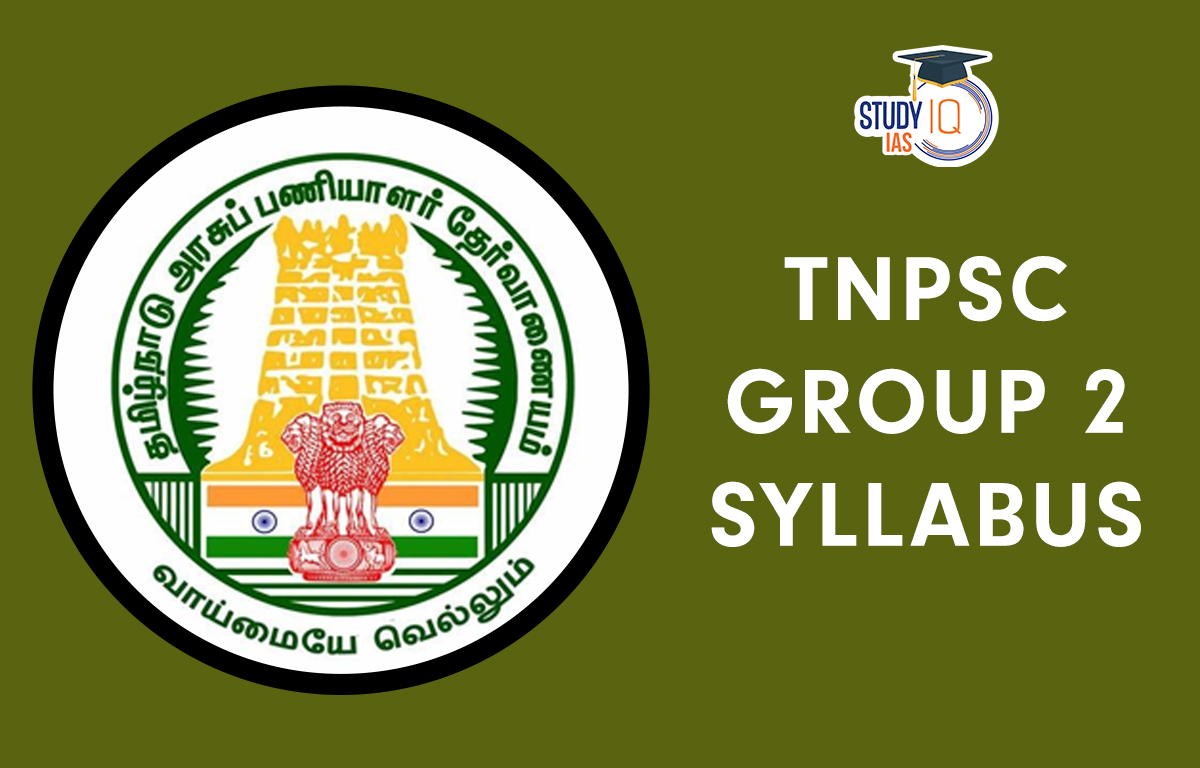
 Daily Quiz 11 July 2025
Daily Quiz 11 July 2025
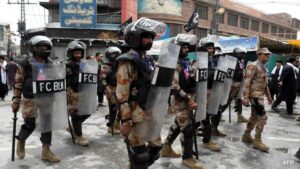 Operation Baam: Baloch Separatist Group ...
Operation Baam: Baloch Separatist Group ...
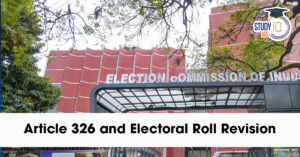 Article 326 and Electoral Roll Revision ...
Article 326 and Electoral Roll Revision ...
